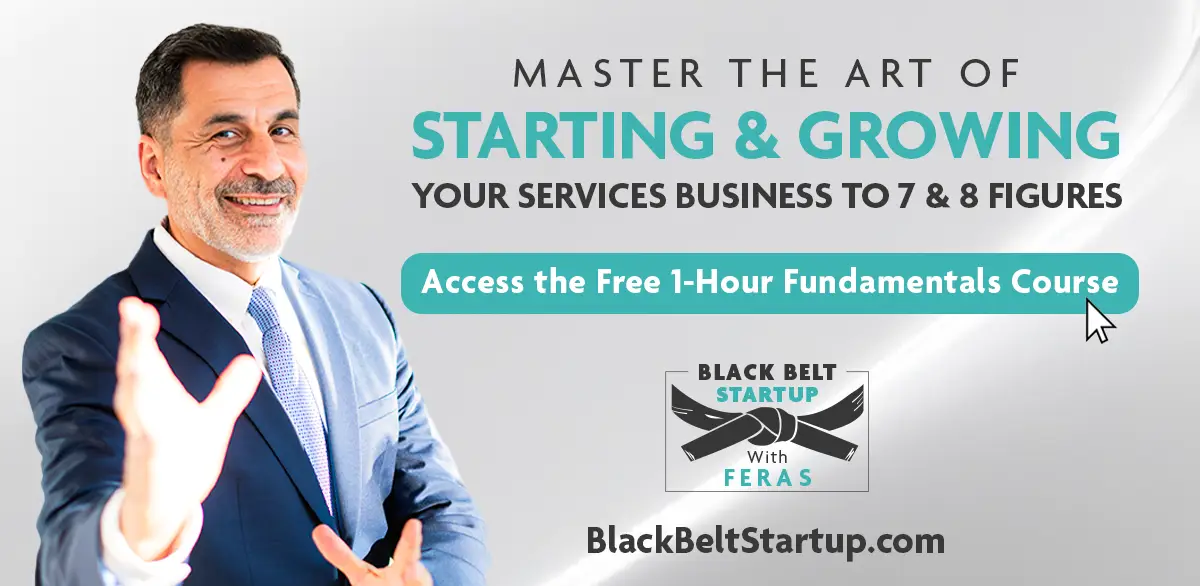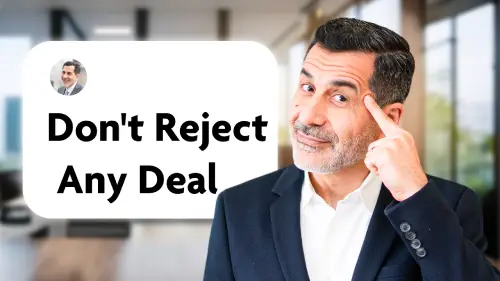Niche Too Soon?

Good Morning!
Last Tuesday, I had two separate meetings scheduled with leads really early in the morning. I had to make a lot of changes to make that happen, but unfortunately, both leads canceled at the very last minute.
They both apologized profusely, so I wasn’t upset. I’m sharing because life sometimes happens. It’s my responsibility now to follow up again and again until I get another meeting with them.
On the Mat
- Too Niche or Not too Niche?
- Should I Quit My New Business?
- End Boring B2B Marketing by Doing Deep Work
- Tools for Freelancers
- How to Sign Bigger Deals with Higher Margins (Even With Insufficient Skills)
- You Don’t Need More Planning
Let's Train
Too Niche or Not too Niche?
Founders often fall into two camps, just like college freshmen:
- The “I have no clue what I want to do” camp
- The “I know exactly what I want to do and how to get there” camp
If you’re in the first group, don’t stress. Clarity comes from client conversations and shipping work. Until then, let’s talk about how to gain that clarity on niching—whether you should do it and how far to take it.
What is niching?
Niching is narrowing your focus by audience, vertical, or service so you’re easier to stand out, refer, and trust.
Some level of niching happens naturally. You’ll find yourself gravitating toward certain types of work, verticals, software, or client segments. The trick is knowing when to let that evolve and when to lean in.
✅ Pros of Niching:
- Easier to position and explain your offer
- Shortens the sales cycle—clients feel “this is for me”
- You build authority and proof faster
- Improves delivery quality through repetition
- Higher referrals and word-of-mouth over time
- Helps you say no to the wrong clients
⚠️ Cons of Over-Niching:
- Can slow early traction if your target segment is too narrow
- May lead to boredom if the niche doesn’t energize you
- Can create false confidence in a market with limited demand
- Hard to pivot if you’ve branded too tightly
- Missed opportunities in adjacent or high-paying markets
Take Tom. He excels at creating Meta ads for Consumer Packaged Goods (CPG) brands. If he introduces himself as “I specialize in paid Meta ads for CPGs” to everyone, he might lose out on SaaS clients or someone needing general ad copy.
Early on, a more flexible introduction, such as “I help businesses achieve better ROI from digital marketing,” keeps more conversations alive.
As Matthew Fenton points out, you can niche by audience, offer, or channel—but you don’t have to lock in all three at once. Start with one, test it, and let data shape your direction.
Bottom line?
Don’t niche in a vacuum. Let your niche emerge from what sticks, and be willing to adjust.
Ask Feras Recaps
Should I Quit My New Business?
🔥 Challenge:
Anton left a 20-year career in HR to start a coaching business for new managers. His idea was sound: to help technical leaders communicate more effectively. But just weeks in, he found himself doubting everything.
Leads dried up. No one closed. He began to wonder if he had chosen the wrong business or if he should quit altogether.
💡 Doing Right:
Anton had the essentials: a solid business plan, legal setup, website, and even a basic sales funnel. He’s intelligent, hardworking, and has clearly thought through his offering. He did more right than most first-time founders.
🛠️ My Recommendations:
Anton’s biggest obstacle wasn’t operational; it was mindset. He needed to resist the urge to pivot prematurely.
I advised him to stay focused, give the business more time, and resist chasing other ideas just because this one felt hard. We also walked through a decision matrix together to assess market demand, the sales cycle, his runway, and, most importantly, whether he still felt motivated about the work.
📈 The Path Forward
Anton realized his expectations were off. Selling a high-trust service takes time. He decided to give it eight more weeks and revamp his marketing. Founders often expect too much too fast. But momentum requires patience, persistence, and data, not doubt.
Thinking of quitting? Ask yourself the hard questions first. You might not need a new idea, just more time with the one you’ve already started.
👉 Watch the video and download the Quit / Pivot / Double Down template here.
Details have been changed to protect anonymity and for storytelling purposes.
You Might Like These
I read this article on B2B marketing, but what stood out to me wasn’t the marketing, but a reminder about shallow work — pushing my cognitive limits more often.
As founders, it’s easy to confuse “being busy” with real progress. We avoid cognitively demanding work by defaulting to small tasks that feel productive.
To produce quality work:
- Don’t hide in easy tasks
- Carve out time to learn how to level up your work
A few days ago, I came across Moxie. I'm not sure if it’s any good yet, but it seems interesting.
It’s built for solo service providers and freelancers to manage proposals, contracts, invoicing, and even client portals — all in one place.
If you’re tired of duct-taping together tools, this might streamline things.
Could be useful for early-stage consultants looking for a lightweight but client-friendly backend. Worth a peek if you’re building solo.
Sharpen Your Blade
You shouldn’t wait until you “feel ready” to take on bigger projects.
Years ago, we got a mobile analytics lead, but we had only done web analytics. The deal was about $30k, so it was too good to pass up.
What did we do? We spent the weekend learning mobile analytics, tested some things, then said yes to the lead.
Not only did we score a $30k deal, but we also went on to start an independent mobile analytics practice and served some of the world’s biggest brands.
Growing your revenue necessitates getting bigger deals. Getting bigger deals necessitates taking on some clients without having every piece of the puzzle figured out.
In this video, I walk through how to buy yourself time, bring in help, and assess risk using a simple framework.
5 assassins are out to get your business.
They quietly destroy your momentum before you even get on your feet.
After 20 years helping service business founders, I’ve seen many repeat the same 5 mistakes:
- Chasing perfection instead of momentum
- Solving problems no one pays for
- Avoiding sales out of fear
- Ignoring feedback
- Building alone
These mistakes don’t just slow you down.
They burn your time and drain your energy.
If you’re trying to move your business forward but feel like you’re spinning your wheels, tune in!
Subscribe to the Black Belt Startup Newsletter
Weekly, 5-minute insights to help you escape the 9–5, land your first clients, and grow a thriving business.




